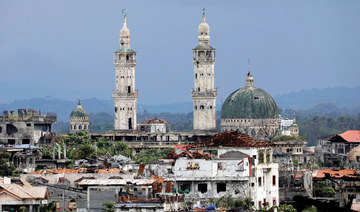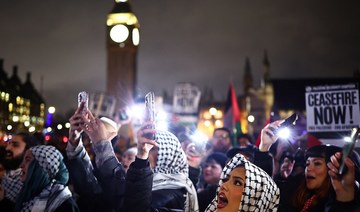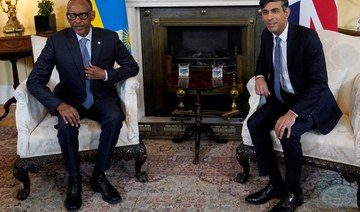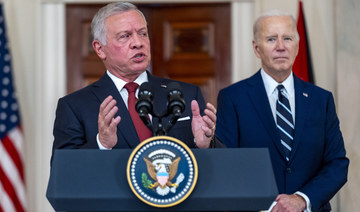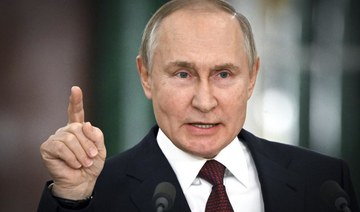MANILA: A Philippine court has found key members of a powerful political clan guilty of the 2009 massacre in southern Maguindanao province that left 57 people, including 32 media workers, dead.
They were sentenced to life imprisonment, which is 40 years in the Philippines, the maximum punishment allowed by law.
The case involves more than 100 detained suspects led by members of the Ampatuan family and many police officers and government militiamen. It has dragged on in a high-profile test of the Southeast Asian nation’s notoriously clogged and vulnerable judicial system. About 80 suspects in the 2009 massacre in southern Ampatuan town remain at large.
While the mass killing has largely unraveled as an offshoot of a violent electoral rivalry common in many rural areas, it has also showcased the threats faced by journalists in the Philippines. Thirty-two of those gunned down were local reporters and media workers in the worst single attack on journalists in the world.
“If I have the power to kill them all in a blink of an eye, I would have done it. But I realized in the end that I’m not a demon like them,” said Mary Grace Morales. Her husband, a reporter of a local provincial newspaper, and her elder sister, the paper’s publisher, were among those killed mostly in a blaze of automatic rifle fire as they begged for their lives.
“What I can accept is a 100% conviction of all the accused,” Morales told The Associated Press in an interview on the eve of the court verdict. “An acquittal of even one of the principal suspects will be unacceptable.”
Morales, her daughter and a handful of close relatives of the slain journalists were flown to Manila with the help of a media watchdog, the National Union of Journalists of the Philippines, to hear the judgment.
In a candlelit protest Wednesday night in a park, they held portraits of their slain relatives and joined reporters in calling for justice, the defense of press freedom and the conviction of the Ampatuan family members, led by Andal Ampatuan Jr.
Then a town mayor, Ampatuan Jr. allegedly led nearly 200 armed followers who blocked a seven-vehicle convoy carrying the wife, sisters and other relatives and lawyers of Esmael Mangudadatu, a politician who decided to run for governor of Maguindanao province. He challenged the powerful Ampatuan clan, who held sway over almost every aspect of life in the impoverished region wrecked by a Muslim insurgency, witnesses testified.
The journalists joined the convoy on Nov. 23, 2009, to cover the filing of candidacy of Mangudadatu in an election office in Maguindanao’s capital. Mangudadatu, now a legislator in the House of Representatives, was not in the convoy for security reasons.
The gunmen commandeered the convoy, including the passengers of two unsuspecting cars that got stuck in the traffic, to a nearby hilltop, where a waiting backhoe had dug huge pits to be used in burying the victims and their vehicles.
Ampatuan Jr. and his followers allegedly opened fire on the victims at close range and hurriedly escaped after sensing that army troops were approaching. The badly mutilated bodies were found inside the vans, sprawled on the ground or buried in the pits with some of the vehicles, in a gruesome scene that drew international outrage and shocked many even in a country long used to political violence.
Ampatuan Jr. along with his father and other siblings and relatives were placed under arrest after negotiations with officials of then President Gloria Macapagal Arroyo. The Ampatuan clan, backed by government firepower and armed militias, had helped quell Muslim guerrillas in the region.
Ampatuan Jr.’s father died in detention in 2015. The family patriarch allegedly approved the plot over family dinner, according to the testimony of one witness.
The Ampatuans have denied the allegations and were expected to appeal if they are convicted. There is no death penalty in the Philippines and life in prison is the maximum sentence.
Human Rights Watch called on the government to bolster efforts to apprehend about 80 suspects who remain at large, warning that they pose a threat to witnesses, including families of the victims.
At least three witnesses against the Ampatuans have been killed over the years, according to Nena Santos, a lawyer for Mangudadatu and families of several other victims. She said she had been threatened with death multiple times and offered a huge amount of money to withdraw from the case.
Gloria Teodoro, whose journalist husband was among the victims, said the government should work to eradicate the lethal mix of problems that allowed the massacre to happen, including the large number of high-powered firearms in the hands of many politicians and clans and a long-entrenched culture of impunity.
A conviction would be a powerful deterrent, Teodoro said.
“If justice is not attained, if they played around with this case, we will see more of these. Maybe not in such a gruesome scale but it will happen again,” she said.
Philippines convicts key clan members in 2009 massacre
https://arab.news/5c3vn
Philippines convicts key clan members in 2009 massacre

- The mass killing has largely unraveled as an offshoot of a violent electoral rivalry common in many rural areas
- A mass of 58 people died in the deadly massacre, including 32 media workers
Muslim group issues UK Labour Party leader with demands over Gaza

- Muslim Vote group calls for ‘real action’ to regain trust
- Support for Labour in recent local elections fell in areas with high Muslim populations
LONDON: Pro-Palestinian activists have presented a list of 18 demands to the leader of Britain’s opposition Labour Party and said they will not vote for the party at the next general election if he does not fulfill them.
The Muslim Vote, a campaign to get Muslim voters to back pro-Palestine candidates, has called for Sir Keir Starmer to promise to cut military ties with Israel, implement a travel ban on Israeli politicians involved in the war in Gaza and impose sanctions on companies operating in occupied territories.
The group told Starmer he must commit to “real action” and deliver on its requests if he was “serious” about his pledge to rebuild trust with those angered by his stance on the conflict in Gaza, The Telegraph reported.
Supporters would vote for the Green Party or Liberal Democrats if he could not commit to their demands, it said.
Labour’s campaign chief Pat McFadden acknowledged that Starmer’s approach to the conflict had cost the party votes at last week’s local elections. Support for Labour dropped dramatically in areas with a high Muslim populations, including Oldham in Greater Manchester, where the party lost overall control of the council in a shock defeat.
After the result, Starmer said he was determined to regain the trust of those who abandoned Labour as a result of his stance on the Gaza war but did not make any concrete pledges on the matter.
The Muslim Vote challenged Starmer with committing to the 18 demands and implementing them should be become the next prime minister.
They include removing the definition of extremism introduced by Secretary of State for Leveling Up, Housing and Communities Michael Gove and issuing guidance that allows Muslims to pray at school.
Philippines rules out use of water cannon in disputed South China Sea

- Philippines and China have clashed several times in disputed, resource-rich waterway
- Latest skirmish took place late last month, in an incident Manila describes as dangerous
MANILA: President Ferdinand Marcos Jr. said on Monday that Manila will not use offensive equipment in the disputed South China Sea, after China’s coast guard used high-pressure water cannon on Philippine vessels last week.
The Philippines and China have had several confrontations in the resource-rich area, where Beijing has used water cannon against Filipino vessels in incidents Manila has described as harassment and dangerous.
The latest in a string of maritime clashes occurred on April 30 as tensions continued to rise in the vital waterway that Beijing claims almost in its entirety despite a 2016 international arbitration ruling that rejected its assertion.
“What we are doing is defending our sovereign rights and our sovereignty in the West Philippine Sea. And we have no intention of attacking anyone with water cannons or any other such offensive (weapons),” Marcos said Monday.
“We will not follow the Chinese coast guard and the Chinese vessels down that road because it is not the mission of the navy (or) our coast guard to start or to increase tensions … Their mission is precisely the opposite, it’s to lower tensions.”
Philippine vessels have been regularly targeted by Chinese ships in areas of the South China Sea that are internationally recognized as belonging to the Philippines, which Manila calls the West Philippine Sea.
The Philippines’ Ministry of Foreign Affairs last Thursday summoned Zhou Zhiyong, China’s deputy chief of mission, after the incident left a Philippine coast guard vessel and another government boat damaged.
It was the 20th protest Manila has made against Beijing’s conduct in the South China Sea this year alone, while more than 150 diplomatic complaints have been made over the past two years.
Marcos said the Philippines will continue to respond to South China Sea incidents through diplomatic means.
Marcos’s statement comes days after the defense ministers of the Philippines, the US, Japan and Australia met in Hawaii and issued a joint statement on their strong objections to the “dangerous and destabilizing conduct” of China in the South China Sea.
UK considered Rwanda-style asylum deal with Iraq
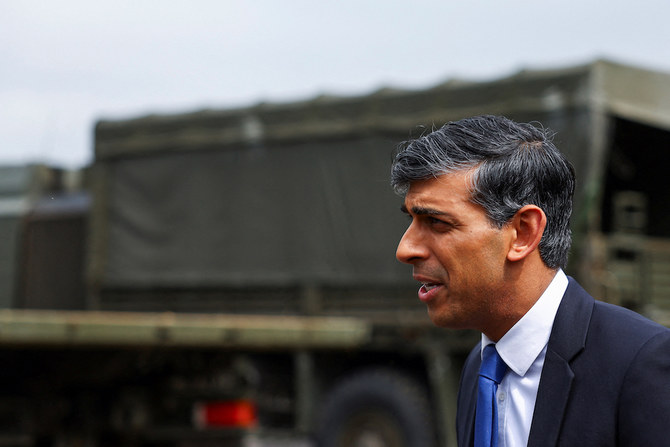
- Documents seen by Sky News reveal London has struck returns agreement with Baghdad
- They also suggest a desire to improve relations with Iran to return people to the country
LONDON: The UK considered sending asylum-seekers to Iraq for processing, new documents have shown.
Iraq is considered very dangerous, with the UK government advising against all travel to the country.
But a plan similar to the Rwanda scheme to process migrants in a third-party country was floated at one stage by Whitehall officials, with negotiations said to have achieved “good recent progress.”
The UK has struck a returns agreement with Baghdad for Iraqi citizens, which was achieved without a formal announcement or acknowledgement and a plea for “discretion,” the documents, seen by Sky News, suggest.
The cache of papers casts new light on the UK government’s approach to dealing with asylum-seekers and illegal migration, including a desire to improve relations with the Iranian Embassy in London in order to ease the repatriation of Iranian citizens, and moves to establish return agreements with Eritrea and Ethiopia.
Biden meets Jordan’s King Abdullah as Gaza ceasefire hopes dim
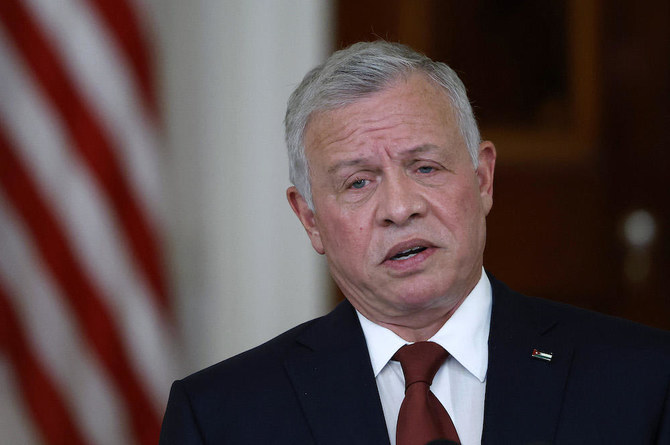
- Monday’s meeting between two leaders is not a formal bilateral meeting but an informal private meeting
- US president Biden faces increasing pressure politically to convince Israel to hold off on an invasion
WASHINGTON: President Joe Biden will meet Middle East ally, Jordan’s King Abdullah II, at the White House on Monday with prospects for a Gaza ceasefire appearing slim and Palestinian Islamist group Hamas and Israeli officials blaming each other for the impasse.
On Sunday, Hamas reiterated its demand for an end to the war in exchange for the freeing of hostages, and Israeli Prime Minister Benjamin Netanyahu flatly ruled that out. Hamas also attacked the Kerem Shalom crossing into Gaza that Israel said killed three of its soldiers.
A Jordanian diplomat said Monday’s meeting between Biden and King Abdullah is not a formal bilateral meeting but an informal private meeting. It comes as the Biden administration and Israeli officials remain at odds over Israel’s planned military incursion in Rafah.
Biden last met King Abdullah at the White House in February and the two longtime allies discussed a daunting list of challenges, including a looming Israeli ground offensive in southern Gaza and the threat of a humanitarian calamity among Palestinian civilians. Jordan and other Arab states have been highly critical of Israel’s actions and have been demanding a ceasefire since mid-October as civilian casualties began to skyrocket. The war began after Hamas stunned Israel with a cross-border raid on Oct. 7 in which 1,200 people were killed and 252 hostages taken, according to Israeli tallies.
Biden last spoke to Netanyahu on April 28 and “reiterated his clear position” on a possible invasion of the Gaza border city of Rafah, the White House said. The US president has been vocal in his demand that Israel not undertake a ground offensive in Rafah without a plan to protect Palestinian civilians.
With pro-Palestinian protests erupting across US college campuses, Biden faces increasing pressure politically to convince Israel to hold off on an invasion. Biden addressed the campus unrest over the war in Gaza last week but said the campus protests had not forced him to reconsider his policies in the Middle East.
Russia’s president Putin orders nuclear drills with troops near Ukraine
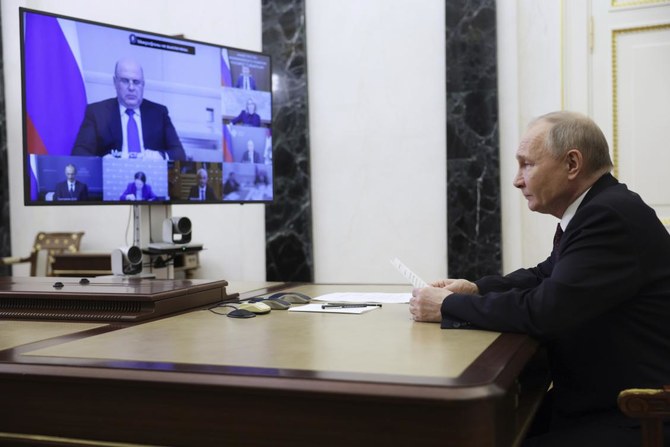
- Putin has upped his nuclear rhetoric since the Ukraine conflict began, warning in his address to the nation in February there was a ‘real’ risk of nuclear war
MOSCOW: President Vladimir Putin has ordered the Russian military to hold nuclear weapons drills involving the navy and troops based near Ukraine, the defense ministry said Monday.
Putin has upped his nuclear rhetoric since the Ukraine conflict began, warning in his address to the nation in February there was a “real” risk of nuclear war.
“During the exercise, a set of measures will be taken to practice the preparation and use of non-strategic nuclear weapons,” the defense ministry said.
Non-strategic nuclear weapons, also known as tactical nuclear weapons, are designed for use on the battlefield and can be delivered via missiles.
The ministry said the exercises would take place “in the near future” and were aimed at ensuring Russia’s territorial integrity in the face of “threats by certain Western officials.”
Aircraft and naval forces will take part, as well as troops from the Southern Military District, which borders Ukraine and includes the occupied Ukrainian territories, it said.
Western officials have become increasingly alarmed by the Kremlin’s nuclear rhetoric during the offensive in Ukraine, with Putin frequently invoking Russia’s nuclear doctrine.
Last year Russia ditched its ratification of the Comprehensive Nuclear Test Ban Treaty and pulled out of a key arms reduction agreement with the United States.



